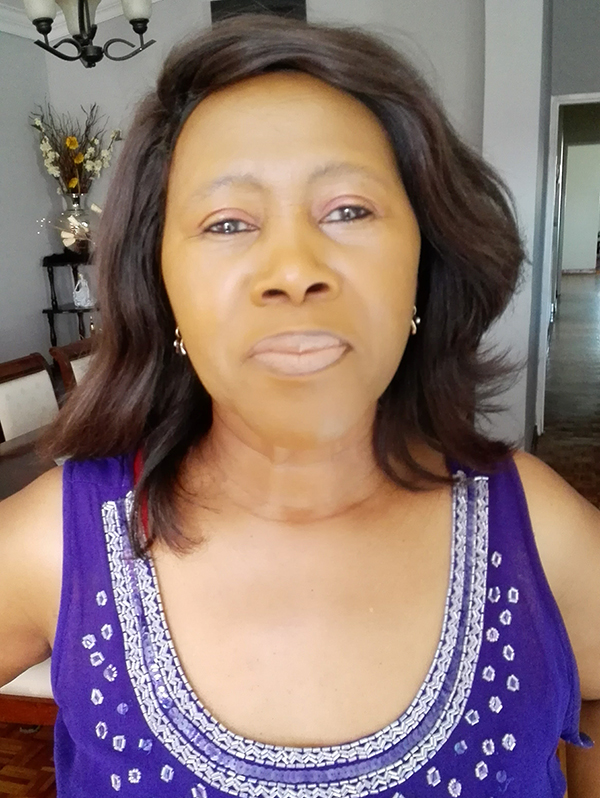
We recently welcomed our first postdoc fellow to the Africa Centre: Dr Nomvo Dwadwa-Henda joined the team in July and will be with us until mid-January 2024.
During this time, she will focus on her research, including publishing articles and book chapters based on her PhD dissertation, writing conceptual papers on topical issues, collaborating with researchers from other fields, writing abstracts for conferences and proposals, and presenting papers. Nomvo will also join the Africa Centre’s academic staff on academic writing retreats and participate in selected projects.
Treating people with disabilities as equals
Nomvo received her PhD in March this year from Stellenbosch University’s Centre for Disability and Rehabilitation on the connection between African spirituality, disability and health, with a specific focus on Xhosa rituals and traditions. Her interest in people with disabilities stems from her decade-long experience as an educator at a school for disabled children.
“I noticed that parents weren’t performing health and wellbeing rituals such as imbeleko (birth ritual), intonjane (female puberty ritual) and ulwaluko (male circumcision ritual) for their children with special needs, although these rituals are performed for other siblings,” Nomvo explains. “Observing parents being overly protective of their children with disabilities also concerned me, as this created the perception that they were less capable than their siblings without disabilities.”
The seed was however likely planted long before her teaching experience. “I grew up in a home where both my parents embraced ubuntu, helping the local people without expecting anything in return. I became attracted to their way of being and doing.”
Acknowledging the connection between rituals and health
The practical impact of Nomvo’s research is widespread. Firstly, it addresses the knowledge gap on understanding disability and how it is expressed in indigenous communities. She highlights that there are very few previous studies that focus on disability and rituals in Africa. Furthermore, the available literature largely views disability as a misfortune.
Nomvo’s research looks at disability through an African lens. “Participants’ conceptualisation of disability is linked to their ancestral reverence, which centres around rituals that connect them to their ancestors for their health and wellbeing,” she explains. This lens is absent in the Global North. For example, for the Bomvana (Nguni people in the Eastern Cape) health is linked to rituals. They believe rituals connect them to their ancestors, who are the intermediaries between themselves and the Creator, thereby bringing them health and avoiding illness.
A second critical outcome of Nomvo’s research is the Ubuntu African Indigenous Inclusive Disability Framework, which is based on the AmaBomvana worldview. “The framework supports inclusive spaces that promote wellbeing, which is why the Bomvana people don’t see disability as a problem,” she says.
A golden thread, and getting practical
While her latest research focuses largely on disability, Nomvo has published several articles about HIV/Aids in peer-reviewed journals, exploring various social, cultural, gender and psychological perspectives on the pandemic. She also worked as a senior researcher at the Centre for Aids, Development, Research and Evaluation. Many of the overarching themes around African spirituality and health that she has covered in her extensive publication record are relevant to the HIV/Aids pandemic and how we continue to deal with its impact on the continent. All of these aspects make her a good fit as the Africa Centre’s first postdoc fellow.
Nomvo believes the biggest challenges Africa faces regarding community mobilisation is gaining access. “Communities often question who comes into their space, asking things like ‘In whose name are you coming here? What is in it for you? Who sent you?’” she says. These questions are mostly accompanied by resistance.
Regarding capacity building, the problem is an age-old one in Nomvo’s view: “Neither South Africa nor the broader continent are taking ownership of their resources. While Africa may have the wealth, it does not have the tools to convert it into a final product and instead has to rely on others, who then take a huge chunk of what is supposed to benefit Africans.”
She believes capacity building must focus on strengthening the resources that are already here, as this will contribute towards socio-economic development and the achievement of the UN’s Sustainable Development Goals, specifically the first goal of no poverty. “A bottom-up approach is necessary. The solutions must emanate from within, while taking into consideration that capacity building is a process.”
As for Nomvo’s personal ambitions for her time at the Africa Centre and beyond: “The Xhosa saying ‘Ungakhwazi ungekaphumi ehlathini’ translates to ‘Don’t shout before you come out of the forest’. So, I am not ready to disclose my next goals!” Considering what she has achieved so far, we are certain many more accomplishments will follow, of which several will hopefully be in collaboration with the Africa Centre.
